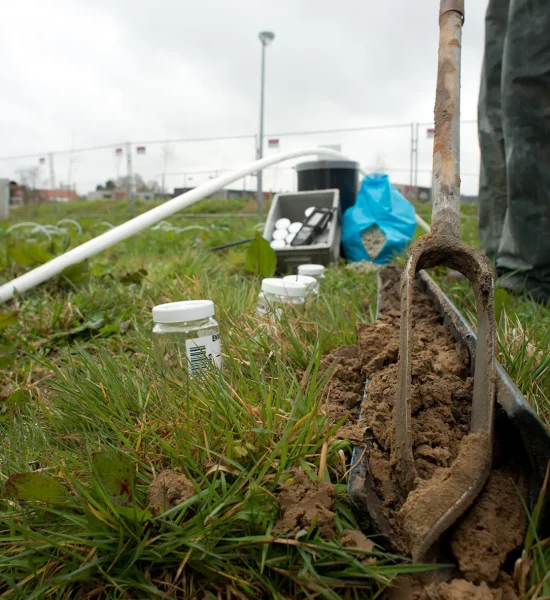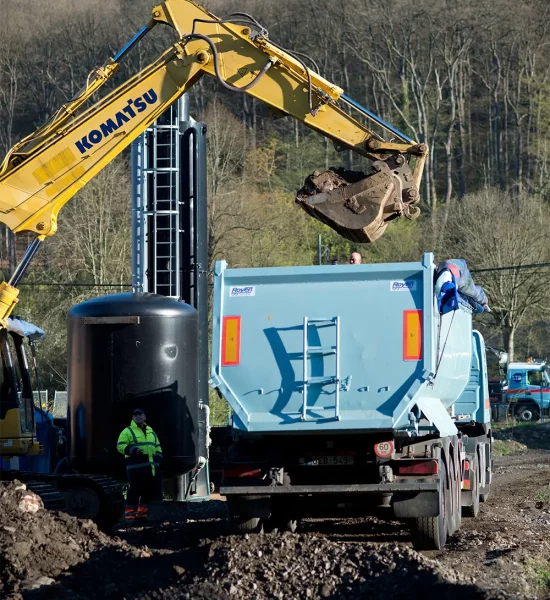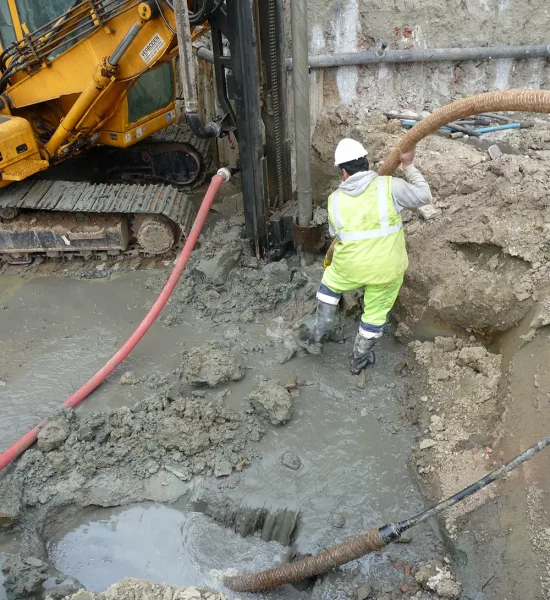Find out what the Universoil team can do for you. Our services include soil investigation and risk assessment, remediation projects and monitoring, excavated soil management and water management.
A soil investigation may be required when selling or purchasing a property or when there is a change in use of a site. An investigation might be required periodically or at the request of a relevant authority, in the case of a permit application, for example. Universoil starts with a strategic plan that reflects on the situation at hand, looking for the best solution for their clients in terms of costs and timeframes.

Once it’s determined in the soil investigation report that remediation is indeed necessary, Universoil submits recommendations on the technique to be used. Depending on how the land is to be developed, Universoil will choose the most cost-effective method for you.
Where possible, we’ll carry out the remediation work to fit in with your business or production schedule, and can even accommodate how your construction site is organised.
In all cases, authorisation from the relevant authorities must be obtained before starting remediation work.
Most projects cannot wait. Our design office will therefore always submit a remediation technique that not only fits in with your project, but which also causes minimum impact and pollution. The chosen technique will depend on the extent of contamination and the presence of any buildings. Where possible, we’ll endeavour to combine construction and remediation techniques.
Various techniques are usually available. The choice will depend on the type and extent of the pollution, the soil type and the presence of any buildings or other infrastructures. Some techniques will be more effective than others and it’s our job to assess them based on the project submitted by the client. Universoil takes into account the pollution standards and assesses the risks based on the concentrations identified to ensure that the remediation work is neither excessive nor insufficient. In the interests of cost-effectiveness, Universoil focuses on optimising the methods for disposal of the excavated soil.
Universoil assists its clients with their earthworks projects.
For projects involving the building of underground car parks, basements, foundations, swimming pools, storm-water tanks or similar structures, a quality assessment of the earth to be excavated is, in almost all cases, a requirement and an administrative obligation prior to its removal. The type of study will depend on the region and destination of the excavated soil.
Universoil holds the relevant certifications in the three regions of Belgium (Brussels, Wallonia, Flanders) and can perform the necessary soil investigations to characterise the quality of the excavated soil. Samples are taken and the physical and chemical quality of the soil is determined.
An RQT (Soil Quality Report) (Wallonia), a TV (Technical Report) (Flanders of Brussels) is used to identify and optimise the facility where the excavated earth will be discharged (reuse as “soil”, direct recycling at a site where excavated material is needed, evacuation to a temporary storage centre of treatment centre, or finally to a landfill). The possible reuse of the soil on site is also assessed in accordance with the conditions in force in the region concerned.

These reports are then validated by the relevant authority: Walterre (Wallonia), Grondbank (Flanders) or Bruxelles Environnement (Brussels).
Once the soil transport documents have been delivered, the excavation works can be carried out and, if necessary, supervised so that it can be guaranteed that the works are carried out in accordance with the defined disposal options. If necessary, Universoil will assist the earthwork contractor by taking additional samples during the excavation works in order to reduce and optimise disposal costs.
An accurate quality assessment of the soil to be excavated, upstream in the project, saves a substantial amount of time and mitigates the risk of cost overruns during the works phase.
All redevelopment projects are facing growing pressure to find an alternative solution to sewerage systems for managing rainwater, and the focus is shifting to direct or deferred re-infiltration into the soil.
Universoil conducts permeability tests to determine the infiltration capacity of your land.
In the case of contaminated land, the risks of pollution spreading are assessed in tandem with these studies.
As part of the selection process for architects, a design that meets the requirements of the proposed project and site environment will be submitted to you.
When a drawdown is required as part of a construction or infrastructure project, it’s important to identify the impact it will have on soil contamination and groundwater in the surrounding area.
Universoil can help you:
While we are currently experiencing periods of drought characterised by low water-table levels, there is a heightened risk of flooding when rainfall intensifies.

For years, Belgium has gradually been adapting its regulatory framework to address issues associated with water management. The procedures intended for the infiltration and temporary storage of rainwater must now be well documented when applying for an environmental or urban development permit.
To further assist you, Universoil has developed relevant expertise in direct and deferred re-infiltration, conducting targeted research in the field to determine the design of re-infiltration facilities. We also provide technical assistance to architects and project owners for construction work in flood-risk areas.
Before installing an open geothermal system on contaminated or potentially contaminated land (in accordance with the Brussels soil Ordinance), a study should be conducted on the potential impact of such a system on soil pollution and water tables. We conduct these impact studies in order to obtain an opinion from the soil sub-division of Bruxelles Environnement regional authority.
